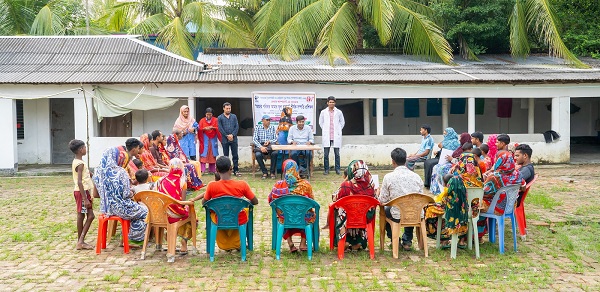According to the 2022 Sample Vital Statistics Report by BBS, about 41% of Bangladeshi youth are inactive, not engaged in education, employment, or training. Among them, girls have a significantly higher inactivity rate of 61.71% compared to boys. To address this, the PPEPP-EU project observed noticeable progress within a year of its completion under EU management.
To enhance the income of extremely poor individuals, mainly targeting women, PPEPP-EU engages them in a variety of income-generating activities (IGAs), including providing financial services, technical assistance, and skills training for both farm and off-farm activities, vocational training, and microenterprise development. From July 2023 to December 2023, a total of 3,300 individuals from participant households received training in various livelihood skills.
To improve the technical knowledge of the young population, the livelihood component of the project conducted various capacity development activities, including training sessions on specific crops, fisheries, and livestock production, as well as post-harvest management. Additionally, the technical team provided support to member households in selecting Income Generating Activities, sourcing inputs, implementation, post-harvest management/storage, and establishing market linkages. These sessions enabled members to acquire practical knowledge on various income-generating activities, accelerating their journey towards prosperity.
Furthermore, the program aims to develop and transform potential livelihoods into business clusters by providing targeted interventions in value chains to support income and consumption gains and reduce vulnerability to shocks.
PPEPP-EU conducts various activities to mobilize young community members through interventions focused on economic empowerment, social empowerment, and access to services and markets. Platforms such as the Prosperity Village Committee, Maa o Shishu Forum, Kishori Club, and Kishore Club address common issues and raise awareness among the targeted community on topics such as resilient livelihoods, nutrition, healthcare, climate change, disability, gender equality, and social issues like dowry, child marriage, and domestic violence. Community mobilization interventions not only connect extremely poor people with income opportunities but also create links with private entrepreneurs, facilitate inclusion in social safety net schemes, and advocate with different service providers.
PPEPP-EU is committed to including women in government social safety net programs, training project staff work to link eligible women with relevant government offices, monitoring the status of the process, and facilitating meetings with various government offices for inclusion in Government’s Safety Net programs.


